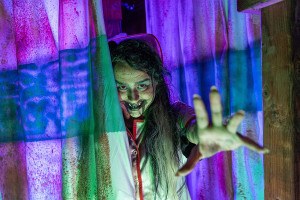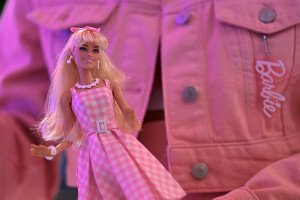Family of the Year Talks Childhood on Martha’s Vineyard, Boyhood Fame

Photograph by Shane McCauley
Last year, Family of the Year’s “Hero” provided the soundtrack not only for the pivotal scene in Boyhood where Mason—the boy that grows up from ages seven to 18 in just under three hours on screen—drives off to college, but also for the film’s victory rounds during awards season. The song played three times throughout the Golden Globes ceremony as the movie picked up its accolades, and an instrumental string version preceded Patricia Arquette’s passionate “Best Supporting Actress” speech at the Academy Awards.
Although the band is now based in Los Angeles, founding members and brothers Joe and Sebastian Keefe spent their elementary and high school years on Martha’s Vineyard, playing music in neighbors’ garages, basements, and bars. Early on, their bands Unbusted and The Billionaires enjoyed local success on the Vineyard and in Boston, but it was in L.A. that the brothers solidified Family of the Year as it is now, bonding with current members James Buckey and Christina Schroeter during warehouse jam sessions.
Ahead of their show at the House of Blues on Thursday, where they will open for AWOLNATION, we caught up with drummer Sebastian Keefe for a glimpse of life on the island and an inside look at the Boyhood phenomenon:
What was it like growing up on Martha’s Vineyard?
It’s cool because you get a lot of energy that comes flooding in in the summertime. We’re surrounded by all sorts of creative types, intelligent types, obviously a lot of successful people. It’s kind of like this really cool, total shift. People that do summer on the Vineyard—it’s always been a place for progressive, forward-thinking, liberal types. Now it’s more like a nouveau riche kind of vibe, but there’s always been an undercurrent of intelligent success. It’s inspiring, to be honest, to be around people that are successful. One day I’d be mowing the lawn of a successful talent agent in Hollywood, and the next day I’d be mowing the lawn of famous psychiatrist.
Did you make a lot of trips to Boston back then?
Definitely for going to big events, like getting a retainer for your teeth or going to your first big concert. All the school trips. Obviously Boston looms large over there in the distance.
What was the music scene like on the island? How did you and Joe get into it?
When it does settle down in the fall and winter, it becomes a very close, creative community. There’s really nothing else to do in the winter—it’s very quiet—so you spend a lot of time playing music if you’re inclined that way. We started playing around 10, 11 years old, started to form bands when we were maybe 12, 13. We put on concerts—there were a few little venues we could rent for like 40 bucks a night, so we’d put up flyers, get all the other teenagers to pay $3 to come, and it was really fun. Joe and I were in different bands at that point—he was in kind of the older brother band, and I was in the younger brother band. We would open up for them.
As the younger brother, how did it feel when Joe [who moved to Boston with his band following high school graduation] asked you to join him?
It was a really big deal to me, even though I guess I was technically an adult at that point. It felt like we were kids, and I was finally allowed to jam with my brother. We were in Boston with a band called Unbusted, and we played there for a while, for about a year. Then we figured we had to make a change of some sort, so we packed up the van and moved to L.A.
What was life like out in L.A.?
We had a couple of bands going for a couple of years, and then everything kind of teetered out. It’s pretty hard in L.A., as you can imagine—it’s not easy. We needed to reset, so we didn’t play any music together for over a year. And then we just slowly got back into it. The members in the band now all began to center our lives around this warehouse building that we’d been renting, just as a creative living space, and so we all started to spend a lot more time there. Whether it was breakups with girlfriends and boyfriends or losing our jobs or whatnot, we all started to coalesce around this music that Joe had been creating. That’s where Family of the Year started—spending a hot summer in this fucking disgusting warehouse in L.A. It was actually great—kind of the best of times and the worst of times.
Your last time in Boston was in April 2013, at Brighton Music Hall. Catch us up on what’s happened since then.
We had just finished touring the U.S., and we kind of considered the album cycle to be over. Then all of a sudden “Hero” became a big pop hit in Europe, so we ended up spending the better part of the year touring and promoting there and playing festivals, and it was amazing, but we kind of disappeared in America until basically the Boyhood thing.
Where did the Boyhood opportunity come from?
It just arrived in the form of an email from our manager. We were like, “This definitely sounds really cool. Richard Linklatler makes really cool films, and we love these actors. Yeah, sure.” But we had no idea what it was going to look like. Then a year goes by, and the movie comes out, and we’re blown away by it. We didn’t know what we were getting into, but it was huge for us. After putting so much work into that record, we kind of felt that it was underachieved, and in reality it’s not a huge success—it’s a small success in this bigger picture—but for us, being at that point in our career, we could’ve never imagined this. We felt like we hadn’t reached the level we wanted to with that record, and so this helped push us closer to where we wanted to be.
How does it feel to suddenly receive so much recognition for a song that was written and recorded years ago?
It’s kind of like this battle, where you’re so happy that people are paying attention to you, and you feel just really grateful for the attention, but then you’re also dying to be asked about what’s next, you’re dying to put the next record out. But things take a long time, and so when you’re starting out, you’ll do anything for any kind of traction. You have to accept that you’re going to go where it’s good, and it’s going to follow you around. Every little thing has led up to where you are, so if you start skipping little things here or there because you don’t think it’s important enough, it doesn’t add up to the same whole. When you’re getting attention, you have to stick with it and put your own artistic ego aside and go with the flow if you want another chance.
What can we expect from your next album?
The new album is going to be out at the end of August, and we have a new single [“Make You Mine”] that just came out. Honestly, in many ways we feel exactly like the same band. While making this new record, we didn’t feel pressured to follow up a huge hit at all. It obviously inspired us—the success of “Hero” and the last record—to be better and keep going, but we’re the same kids.
You’re set to play at the House of Blues on Thursday. What’s it like to perform in Boston?
I’m not that nostalgic about it for some reason. As far as the rock clubs in Boston go, we did those when we were teenagers. But you know that big, half-open tent thing on the water [Blue Hills Bank Pavilion]? If I played there, that would be like an “oh, shit” moment. That’s where I saw Radiohead and the Strokes. That would be a real big thing. We’ve spent so much time in small clubs and small theaters, so at this point taking the next big step is what we’re really looking forward to.
What about the moment in 2009 when Ben Folds selected you to open for his performance with the Boston Pops at Symphony Hall? That seems like a big step very early on.
It was crazy. That was really huge for us because it was our third or fourth concert ever as this band, and being from Boston—that was an “oh, shit” moment.
This interview has been condensed and edited for clarity.


